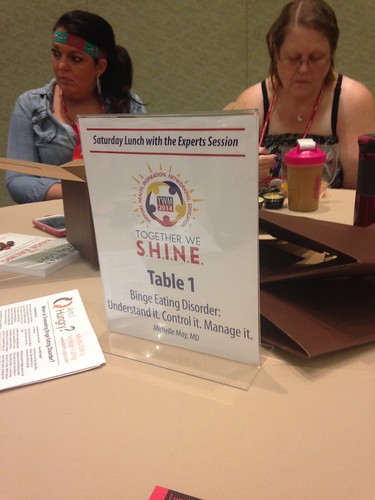First, thank you for your patience in waiting for me to post this! And my apologies for the delay.
As it usually happens with me there was a bit of a challenge in writing this recap in that I lost my notes! I’m going from memory here but thankfully I have a good memory so let’s get to it!
For background, this is a recap of a special “Lunch With the Experts” session that was offered as a part of the Obesity Action Coalition’s “Your Weight Matters” Convention which was held in Orlando, FL September 25 – 28, 2014.
About the Expert
Michelle May, MD is the author of Eat What You Love, Love What You Eat: How to Break the Eat-Repent-Repeat Cycle (Am I Hungry? Publishing, 2011). In this book, she lays out what she calls The Mindful Eating Cycle, which is a framework that shows how any person – no matter what size they are – approaches eating. She uses this framework to help people understand not only what they eat, but why they eat, especially when they are not physically hungry.
Some Binge Eating Resources
The notes I lost had a lot of binge eating resources but I went through and Googled quite a few for you guys. Here are some:
- BingeEatingDisorder.com – This site is mainly for health professionals but gives some good statistics about the prevalance of binge eating in the United States.
- Did you know Binge Eating Disorder is now contained in the Diagnostic Statistical Manual V (which is a manual that helps define psychological disorders so that they can be effectively treated? Click that link to read more, although I’m going to outline the definition a bit below.
- There is also a Binge Eating Disorder Association dedicated to providing accurate information about binge eating and advocating against binge eating and obesity bias.
So what is Binge Eating?
According to the Diagnostic and Statistical Manual V (DSM-V), a person with Binge Eating Disorder may:
-
have recurring episodes of eating significantly more food in a short period of time than most people would eat under similar circumstances
-
feel a lack of control over how much they eat
- eat quickly and even when not hungry
- have feelings of embarassment, shame or guilt about what/how much they eat, such that they eat alone to hide the behavior
Binge Eating disorder affects nearly 3 million adults in the U.S. and it affects twice as many women as men. (BingeEatingDisorder.com)
That means that if you are a binge eater, you are not alone. Far from it!
What to do if you think you are a Binge Eater
The thing Dr. May stressed again and again is that this is a disorder. Many people, because they feel guilt and shame about binge eating, try to handle the problem themselves. That rarely works. She strongly suggested going to see a licensed therapist and especially one who specializes in binge eating disorder.
Dr. May also stressed (as did several practitioners at the convention) that it’s not so much about what you eat, but why you eat that’s at the root of most people’s problems with both binge eating disorder and obesity. That’s not to say we shouldn’t focus on eating healthfully but one point she made struck me as particularly important (so much so that I’m going to bold and underline it).
Even if you have limited yourself to bingeing on healthier options, let’s be clear: you are still taking in more food than your body needs or is asking for.
That’s important to note. Many of us think we are doing less harm by choosing “healthier” binge options. In reality, while the substitution is probably more nutritious than a less healthy food we can choose, it is not necessarily healthier from a mental health perspective.
So again, if you think you may be a binge eater:
- Consider the DSM V guidelines and be honest with yourself. Do they apply to you?
- Seek professional help from a licensed therapist who has experience treating people with binge eating disorder. If you don’t know of one you can ask your primary care physician OR your bariatric practice.
- Take heart. As stated above, if you binge eat you are not alone. There are many people coping with this problem and there are communities to which you can turn for support. But you have to take that first step!
Follow Dr. May for more resources
I highly recommend following Dr. May online for more information and resources. Here’s how you can do that.
- If you’d like to check out Dr. May in general, her website is: www.AmIHungry.com.
- Her Twitter handle is @EatWhatYouLove
- Look for her on Facebook at the “Am I Hungry?” page
- Check out her book, Eat What You Love, Love What You Eat: How to Break the Eat-Repent-Repeat Cycle. I bought the book (along with a companion book specifically on binge eating and the companion workbook). As I go through it I’ll share any insights I learn!
And for those of you still reading, I took many pictures during Dr. May’s general education presentation at the conference, which I’ve housed (along with all the other photos of the fun I had while at the convention) in this Flickr Album. Enjoy!
 Bariatric Foodie Play with your food
Bariatric Foodie Play with your food

